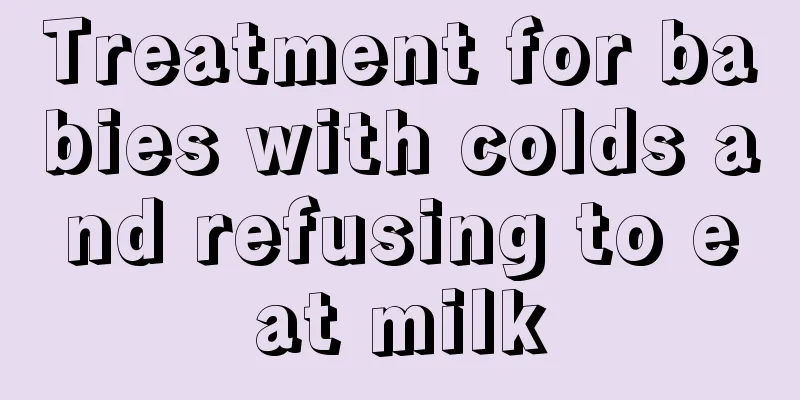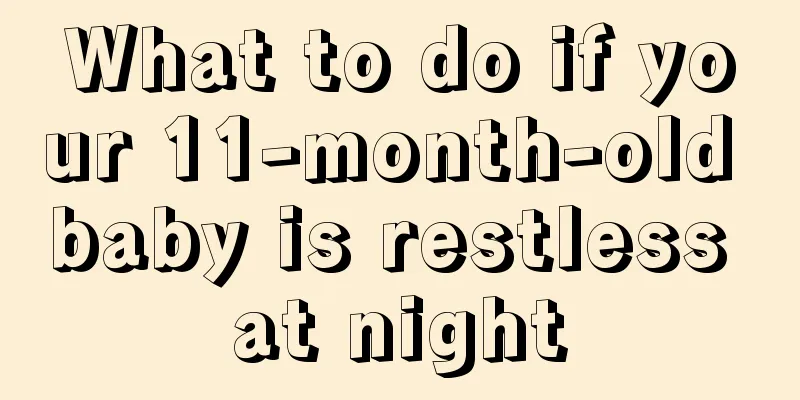Treatment for babies with colds and refusing to eat milk

|
As parents, when our children catch a cold and refuse to feed, we are all worried. We often take our children to seek medical advice in the middle of the night, which tortures the children and many parents. So, is there any good way to treat the situation where babies catch a cold and refuse to feed? It can not only solve the problem of babies refusing to eat milk due to colds, but also reduce troubles for our parents. Here we will introduce the treatment method for babies refusing to eat milk due to colds. Treatment: 1. It is recommended to hold the baby while breastfeeding. If breastfeeding in a lying position is necessary, the head should be high and the feet should be low. For breastfeeding, clean the nipples with warm water before each feeding, and hold up the breast with four fingers, with the thumb placed on the areola on the nipple to slow down the flow of milk. For bottle-feeding, clean the feeding utensils with boiling water before each feeding, and feed after the nipples are filled with milk. The nipple hole should not be too large. After breastfeeding, hold the newborn upright and pat its back to help it expel the swallowed air. It is not advisable to lift the newborn's lower limbs to change diapers within a short period of time after breastfeeding. 2. For infants and young children who vomit frequently, if organic diseases and gastrointestinal inflammation are ruled out, most of the cases are gastroesophageal reflux. You can choose the lateral position with the head high and feet low, with the head raised 15°; for children with gastroesophageal reflux, the head can be placed in the prone position, for 20 minutes each time, 2-4 times a day. However, there must be someone to take care of the patient during the prone position to prevent respiratory apnea. This can reduce the frequency of reflux, reduce the number of vomiting, prevent aspiration of vomitus, and avoid aspiration pneumonia and suffocation. 3. Recurrent vomiting and nervous vomiting: Strengthen physical exercise, improve physical fitness, lead a regular life, avoid overeating, try to keep your body and mind calm, and don't force yourself to eat. Also, be sure not to add any stress to the child, as this will make the vomiting worse. Children with the disease should arrange their lives reasonably, including diet, strengthen physical exercise and increase physiological sleep time. People around the child should not pay too much attention to the child's vomiting symptoms and should avoid showing nervousness and worry in front of the child to increase his confidence in treatment. At the same time, keep the environment clean, deal with the child's vomit in a timely manner, and replace contaminated clothes, sheets, and quilts in a timely manner to avoid further irritation to the child. When vomiting, you should stay by the child's side and give him/her mental comfort; after vomiting, help him/her rinse his/her mouth in time, bathe the child frequently, and remove the odor left on the body by vomiting. 4. For children who are prone to vomiting, especially those who vomit after catching a cold or coughing: they should strengthen their nutrition and physical exercise to improve their body's immunity, or take bovine colostrum and transfer factor to prevent colds; meals should be regular and quantitative; do not eat too much; food must be fresh and hygienic; do not feed the child overly spicy, smoked, or greasy food. 5. Children who are prone to vomiting when taking medicine: when feeding the medicine, the liquid medicine should not be too hot or too cold; children who are difficult to feed medicine can also be given small amounts and multiple doses; if necessary, they can take a mouthful and wait for a while before taking the medicine again. After vomiting, clean the mouth, face, and neck skin promptly, and change contaminated clothes and bed sheets. 6. Some children are born with a sensitive pharyngeal reflex, which can easily cause vomiting. This manifests as vomiting when they catch a cold. Therefore, when seeing a doctor, you should explain this to the doctor. At this time, you should eat easily digestible liquid or semi-liquid foods, and don't eat too much, generally about half of your usual diet. The above content introduces to us how to treat the situation where babies have colds and refuse to eat milk. When our babies have colds and refuse to eat milk, we can treat our children faster and better, which can make the children recover faster and also save our parents from unnecessary worries. I hope the above content will be helpful to everyone. |
<<: When is the best age for weaning babies and what should we pay attention to?
>>: Treatment for newborns who suddenly refuse to breastfeed
Recommend
Why do two-month-old babies not like to sleep and what should we do?
Babies are little lives that have just come into ...
Who determines a child's IQ?
We all hope to have a lovely child. According to ...
Symptoms of a ruptured eardrum in a baby
There is a tympanic membrane inside the ear, whic...
What is the effect of infant spleen-strengthening powder
Infant Jianpi Powder is a common infant medicine....
The best time to wean your baby
For mothers, as their children grow up, the vario...
What should I do if my one-year-old baby has developmental problems?
Every baby captures the hearts of his or her pare...
How to quickly eliminate children's bloating
Children's stomach bloating will make them fe...
Coffee spots on children
Coffee stains are something that many people don’...
Hidden phimosis in children
When children are starting to grow, parents shoul...
Where do children come from?
When we were very young, we always asked our pare...
What causes febrile seizures in a 2-year-old?
Many babies will develop diseases during the proc...
The child has a stomachache at night but not during the day
The physical health of children is the most impor...
Hearing screening methods for children
Children's hearing is of particular concern t...
Air is just one of the factors that trigger coughing: Common causes of coughing in children
As winter approaches, the northern regions have a...
What are the foods for children to clear away heat and detoxify?
There are many foods that can clear away heat and...









